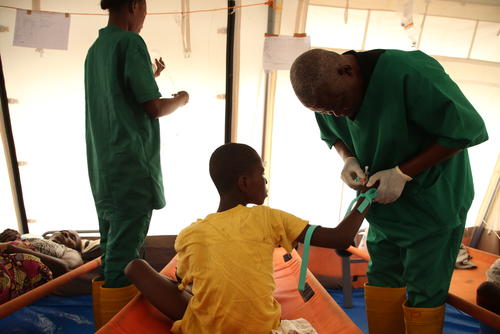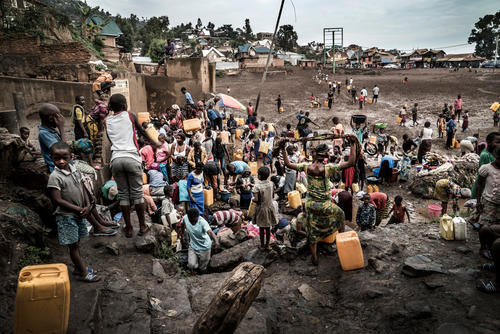The Democratic Republic of Congo (DRC) is currently facing its most significant cholera outbreak for 20 years.
In 2017, 55,000 people fell ill across 24 of the country’s 26 provinces, and 1,190 died.
Medecins Sans Frontieres (MSF) has been at the forefront of the medical and humanitarian response, treating half of cases (around 25,300 people) across the country, especially in the provinces of Kongo Central, Kwilu, Kasaï, Haut Lomami, Maniema, Tanganyika, South Kivu, North Kivu, Ituri and Bas-Uélé.
The epidemic has now reached the country’s capital, Kinshasa. This megapolis of 12 million people is the nerve centre of the country’s trade and home to one in every six Congolese. It is vulnerable to cholera because of a lack of drinking water, sanitation, and health infrastructure that is properly adapted to provide treatment in cholera-affected areas. From the end of November until 22 January 2018, health authorities indicated 826 suspected new cases and 32 deaths (mortality rate 3.8 per cent).
To contain the epidemic, teams from MSF’s ‘Congo Emergency Pool’ are bolstering the two cholera treatment units (CTUs) in Camp Luka and Pakadjuma, to ensure that 24/7 patient care is available in the most affected health zones (Binza Méteo, Kitambo and Limete). Since the beginning of activities on 16 January 2018, MSF has treated 157 patients. Of these, almost 40 per cent had severe dehydration, one person died and 133 have been already discharged.
The need to act quickly
“Faced with the spread of this epidemic, as of last week we have stepped up our intervention by treating patients in the treatments units, and by putting in place 10 rehydration points, epidemiological surveillance activities and education, and an ambulance service,” says Jean Liyolongo, from MSF’s Emergency Pool in Congo.
“Cholera is affecting the parts of Kinshasa that are densely populated, so it’s crucial to act quickly to prevent the spread of this epidemic. By providing quick and free treatment for patients, alongside support to healthcare providers, we can ensure proper care for those who are ill.”
In areas where access to drinking water and sanitation is poor, cholera is a highly contagious disease. The illness causes severe diarrhoea and vomiting, leading to patients becoming rapidly dehydrated. It has been present in the country since the seventies and is endemic to nine provinces of DRC, especially around the Great Lakes in the east of the country.
Stigma
“A few days ago I got very ill, with severe diarrhoea and vomiting. In my neighbourhood, here in Camp Luka, there were already a lot of cholera cases. That’s why I asked my husband to take me to the health centre,” says Marie*, a patient in MSF’s health centre in Camp Luka.
“I was very weak and so we tried to take a moto-taxi but everyone refused us. Here in Kinshasa there’s a lot of stigma attached to cholera, it’s a shameful illness. My husband had to carry me on his back for three kilometres to get me here.”
*Fictional name to preserve the patient's anonymity
MSF has worked in DRC since 1981 and today works in 20 of the country’s 26 provinces, offering medical care to the victims of conflict and violence, to displaced people and to those suffering in epidemics or pandemics such as cholera, measles and HIV/AIDS. Emergency response teams are ready to react across the whole country in case of an epidemic, a natural disaster or conflict.






